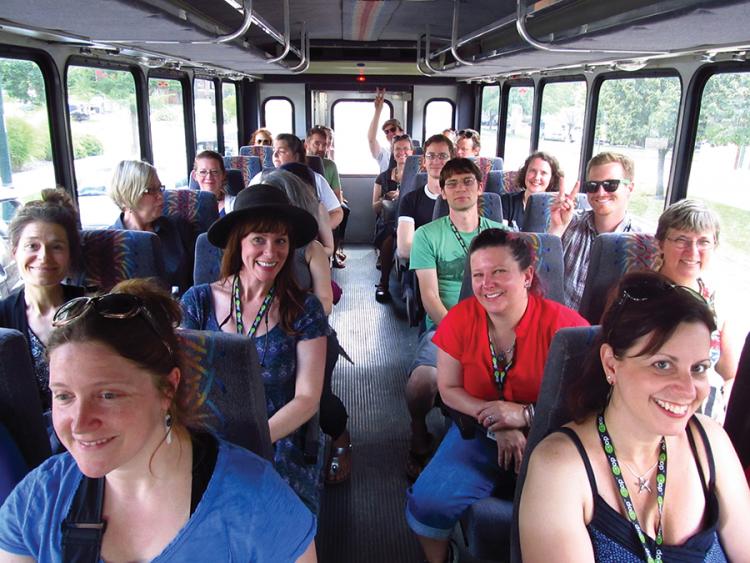NCG Hosts Marketing Matters 2015

National Co+op Grocers (NCG) held its annual Marketing Matters conference July 8–10 in beautiful Boise, Idaho. More than 120 co-op marketing and owner services staff came together for this event—featuring retail tours of Boise Co-op and several competitors, followed by two full days of conference sessions focused on the theme of competition.
NCG’s national co-op development manager, Dave Olson, kicked off the conference Thursday with a keynote titled, “Competition: The New Normal,” in which he shared industry trends and some of the keys for co-ops to thrive in today’s competitive landscape. He also shared NCG’s view on the cooperative hierarchy of needs and what it looks like to move from basic retailing to achieving cooperative self-actualization.
A peer panel composed of New Leaf Market’s Cristin Burns, Outpost Co-op’s Lisa Malmarowski, and Boise’s own Ben Kuzma shared insights on what they learned from competitors. The panelists encouraged attendees to be actively preparing for competition and to challenge their assumptions regarding competitive threats.
NCG’s Kelly Smith and Jeanne Lakso followed with a presentation on the “Seven Ps” of service retail. It focused on operationalizing branding; translating research from NCG and The Hartman Group into action; and developing a common language for talking about co-op points of difference and how to appeal to mid-level consumers.
Two more peer sessions rounded out Thursday afternoon. Wheatsville’s Dana Tomlin and Raquel Dadomo gave a lively presentation on their co-op’s approach to pricing, emphasizing that developing a positive price image requires a clear and comprehensive pricing strategy supported by strong marketing.
Michelle Schry and Ann Mull of People’s Food Co-op of La Crosse and Rochester followed with an equally entertaining presentation on how their co-op redefined its product policies to better meet the needs of its owners and community members. Schry shared that an important point in the process was deciding that their co-op wanted to be purchasing agents for their customers—not selling agents for producers—and realizing that conversations about health, sustainability, local agriculture, and organics aren’t possible without first bringing people into the store.
Day one concluded with competitor study table discussions and a beautiful patio reception with sunny skies, good food, and good company!
Day two began with program updates from NCG staff. Allie Mentzer provided an update on NCG’s advocacy initiatives, with a focus on GMO labeling; Sheila Samuelson offered an overview of NCG’s Co+efficient sustainability and impact reporting system; and Liz McMann introduced the support available through NCG in her new role as centralized services marketing manager.
In “Our Best Idea (Which You Can Steal),” our last peer panel, three attendees offered examples of their most successful marketing and membership initiatives. Kristy Maggard of Good Foods Co-op shared how a spirit of giving helps create community and attract shoppers to their co-op. Krysta Gunvalson of Mississippi Market explained the co-op’s LIME program, designed to help make co-op membership affordable to low-income customers. Finally, Viroqua Food Co-op’s Shana Meshbesher shared information on her co-op’s approach to promoting local producers: outdoors, during winter, in Wisconsin, of course! Their presentations sparked numerous audience questions from fellow co-op marketers eager for even more details.
Janelle Orsi, co-founder and executive director of the Sustainable Economies Law Center, wrapped up the conference Friday afternoon with a discussion of food co-ops and their impact on the cooperative economy.
As always, Marketing Matters attendees took advantage of the opportunity to connect with peers, share stories and suggestions, and exchange nifty swag.
We hope everyone went back to their co-op both energized and armed with some specific ideas to meet the opportunities and challenges that our competitive environment presents. It may be getting harder to compete, but we have no doubt that co-ops can continue to not only survive but thrive in their local communities! ♦







